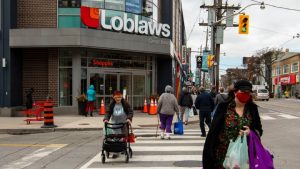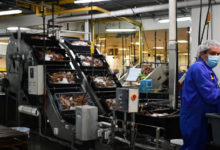Loblaw hikes dividend on higher grocery sales — but no plans to bring back pandemic pay hike, too

Loblaw Cos. Ltd. is seeing significantly higher sales across all of its brands of grocery stores, enough to hike the company’s dividend to shareholders even as it sticks by a decision to roll back a $2-per-hour pay bump for workers.
The grocery retailer reported higher profit and sales for the three-month period up to the start of October, with same-store sales at Loblaws, Zehrs, Your Independent Grocer, Real Atlantic Superstore and Provigo up 9.7 per cent, and 4.7 per cent at discount brands No Frills and Maxi. Which means company-wide, the chain “continued with its 2020 winning streak,” Loblaw president Sarah Davis said.
The company said that eight months into the pandemic, it looks like Canadians are grocery shopping less often, but buying more when they do.
“At the height of the pandemic, there would have been the panic buying,” Davis said during a conference call with investors. “But I would say now, through Q2 and Q3, it’s stabilized and people are just buying bigger-size packs.”
Revenue totalled $15.67 billion, up from nearly $14.66 billion in the same quarter a year earlier.
But some of those higher sales were offset by roughly $85 million in COVID-19-related expenses, and higher labour costs associated with booming e-commerce sales from home delivery.
That translated to an adjusted profit $464 million, or $1.30 per diluted share, up from an adjusted profit of $458 million, or $1.25 per diluted share, a year ago.
All in all, the company was confident enough with its financial performance to boost its dividend by two cents a share, to 33.5 cents.

The company did not, however, see fit, to reinstate the $2-an-hour pay raise it gave workers early on in the pandemic before rolling it back in June.
There have been calls to bring the so-called COVID pay back for front-line retail workers, but a spokesperson for Loblaw said the company has no plans to do so.
“The temporary pay premium, introduced at the height of the panic buying and uncertainty, was never about safety. It was a recognition of extraordinary effort. Our stores are now operating at a normal pace, albeit in a new way. Importantly, we have invested far more in our colleagues and customers during this pandemic than we have earned in extra sales,” Catherine Thomas told CBC news in an emailed statement, referring to the $85 million in COVID-19-related costs.
“Those investments will continue well into the future…. The company remains absolutely committed to its investments in colleague and customer well-being. Any suggestion of profiteering is untrue and ignores the facts.”
Higher costs
The company has been squeezing suppliers, too, informing them that the cost of getting products on shelves would go up in January.
Citing plans to invest $6 billion in improving its in-store and digital operations over the next five years, the company said in a supplier letter that the grocery business has become “more challenging and costly to operate.”
Analysts say those costs are likely to be passed on to customers, but the company told suppliers that it is committed to protecting customers from the risk of higher prices.
Galen Weston, executive chairman of Loblaw, reiterated the retailer’s pledge to avoid price increases on Thursday.
“The company remains steadfast in its commitment to put customers and colleagues first, as we sustained investments and safety measures at store level, while resisting pressure to raise prices at a time when Canadians need value more than ever,” he told investors.
Finance professor Stephen Foerster at the Ivey Business School in London, Ont., said there are no easy answers to what the company should do, but there is nothing wrong with viewing shareholders as the primary stakeholders.
“If the optics look bad, that can hurt a company’s brand, and ultimately profitability and ultimately shareholders,” he said in an interview.
“The challenge is to strike that balance to make sure employees and other stakeholders are fairly treated.”








Redes Sociais - Comentários